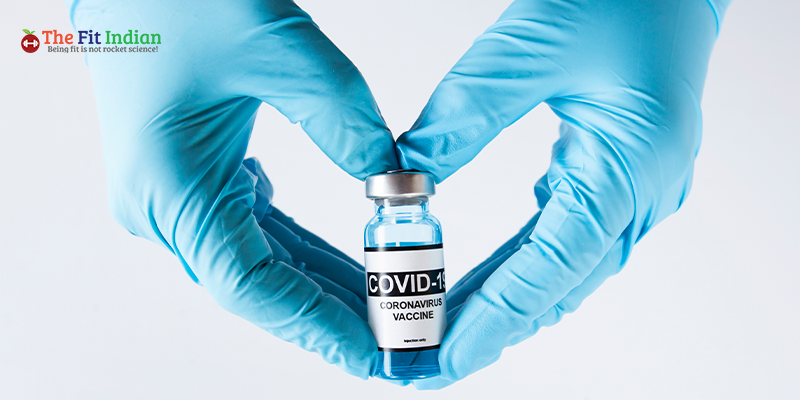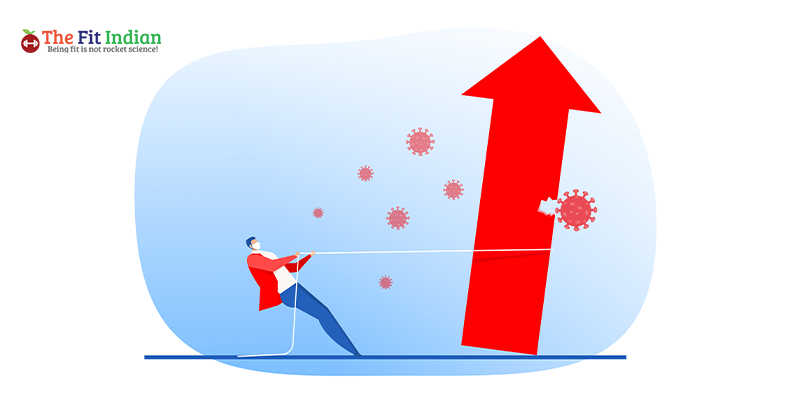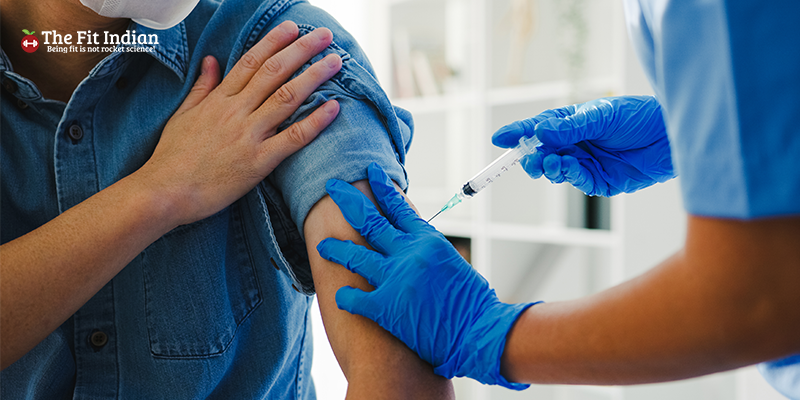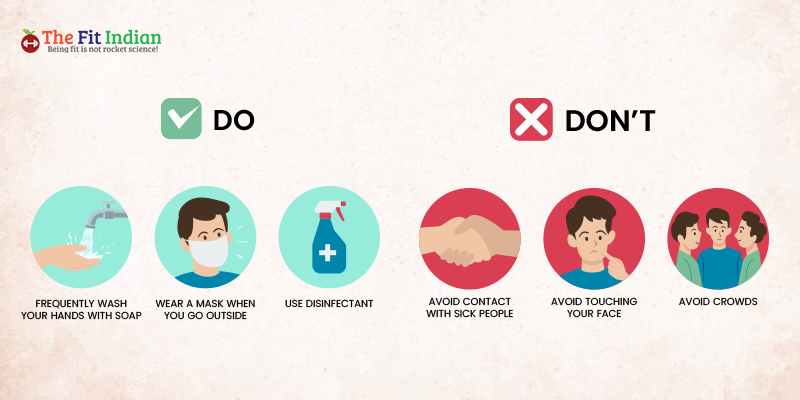COVID-19 After Vaccination – Should you be Worried?
Reviewed by: Dr Swamy K B | Author: Manoja Kalakanti
The COVID-19 crisis that took the world by storm has caused widespread chaos as nations hastened to find a cure. As governments across the globe struggled to reign in this deadly pandemic, new developments in vaccine development kept hopes alive. After a long struggle, the vaccines finally started rolling out with equal parts, hope and scepticism. Several bizarre theories and fears were unfounded and soon put to rest.
The vaccination drives have been a resounding success, with cases going down and curbs lifted in many countries as life returned to normalcy. But COVID-19 cases after vaccination have left many confounded. Many people are getting infected with coronavirus after being partially or fully vaccinated. It is understandable that a partially vaccinated person, i.e. someone who received only one dose of the vaccine, gets infected—but getting infected even after complete vaccination has caused widespread apprehension about the future. So, what is causing this post-vaccination infection? Are you at risk? And should you be worried? Read on to find out!
It is understandable that a partially vaccinated person, i.e. someone who received only one dose of the vaccine, gets infected—but getting infected even after complete vaccination has caused widespread apprehension about the future. So, what is causing this post-vaccination infection? Are you at risk? And should you be worried? Read on to find out!
COVID-19 Cases After Vaccination – Are They on the Rise?
A phenomenon has been emerging: the rise of ‘breakthrough cases’ or individuals getting infected, despite being fully vaccinated. There has been a noticeable rise in such cases. But experts claim this is not uncommon, and there is no need to panic.  This rise in infections has resulted in people questioning the efficacy of the vaccines. This sudden spike in infections has been blamed on a much more infectious Delta and other new variants. Regardless of these recent developments, experts haven’t sounded the alarm bells. While fully vaccinated people are at a significantly lower risk of suffering from severe illness, getting hospitalized, or even death, it is still advised to be careful post-vaccination because a rise in the Delta variant is still a cause of concern.
This rise in infections has resulted in people questioning the efficacy of the vaccines. This sudden spike in infections has been blamed on a much more infectious Delta and other new variants. Regardless of these recent developments, experts haven’t sounded the alarm bells. While fully vaccinated people are at a significantly lower risk of suffering from severe illness, getting hospitalized, or even death, it is still advised to be careful post-vaccination because a rise in the Delta variant is still a cause of concern.
So, we now know that COVID-19 infections are indeed on the rise. But what is the reason behind it, and who’s at risk? Let’s find out!
The Reason for Infection in Vaccinated People
It shouldn’t be surprising that only partially vaccinated people get infected since partial vaccination does not provide the body with complete immunity to the virus. But why are people who are completely vaccinated also getting infected? What are the reasons for cases of COVID-19 after vaccination? 
Perhaps the most common reason for the rise in infections in people who have received both their shots and are hence deemed immune is a lack of precautions. First of all, even fully vaccinated people are not entirely immune to the infection. It is also important to ensure that your immune system is healthy, so get in touch with a doctor or a nutritionist for a diet plan to boost your immunity.
The other reason is that often people might have gotten infected just prior to getting the vaccine. Another reason could be getting exposed to the virus before the effects of the vaccine take hold. It takes two weeks or slightly more for the vaccine to boost your immunity against the coronavirus. If you come into contact with the virus during this period, your immune system isn’t yet strong enough to fight off the virus.
Can Vaccinated People Spread the Virus?
A recent study suggests that vaccinated people can spread the virus at the same rate as unvaccinated people. Not only do vaccinated people spread the virus, but alarming signs also show the presence of the Delta variant in many of those vaccinated people who are infected. And the Delta variant is known to be several times more contagious than earlier strains. So, if you are vaccinated against COVID-19, you must take care to protect yourself and others.
Now that you know the reason for the infection post-vaccination and the probability of vaccinated people spreading the virus, let’s look at the basic rules to follow after your shot.
Do’s and Don’ts After Vaccination to Avoid Infection
One of the primary reasons for the rise in cases of infection amongst those fully vaccinated is the negligent attitude after getting the shot. Many people tend to throw caution to the wind and resume their daily activities sans the precautionary measures they were accustomed to prior to the vaccination. This results in a drop of the guard, which inadvertently leads to a higher chance of getting infected.
So, even after vaccination, it is crucial for people to take the same precautionary measures. Follow these steps to keep the virus at bay:
- Do’s
1. Wear a mask when you go outside
2. Wash your hands frequently, especially before touching your face
3. Disinfect any surface that you might come into contact with
4. Maintain social distancing
- Don’ts
1. Don’t come in close contact with an infected person
2. Don’t touch your face too often
3. Do not go to crowded places
4. Share food and utensils with others
No vaccine can make you completely immune to the COVID-19 infection. You can still get infected and also spread the disease. Although the effects might be less severe compared to when you are not vaccinated, it is still recommended that you take necessary precautions and stay safe. In case you do fall sick, you can follow these diet recommendations for recovery.
Diet Tips to Follow When you are Infected with COVID-19
Diet plays a vital role in all aspects of our life. A good diet can help us live a long and healthy life, while a bad diet can result in health problems. Following a healthy diet has become more crucial during times of a pandemic. A robust immune system can help your body fight off the coronavirus. The following are just some of the general recommendations. For a comprehensive and customized diet plan, get in touch with a nutritionist.
1. Keep yourself well hydrated at all times
2. Cut down on sugar and salt consumption
3. Supplement your diet with multivitamins, especially vitamin C and D
4. Consume a diet rich in protein
5. Don’t eat excess fats and carbs
6. Eat a diet rich in fruits, vegetables and dry fruits
The body requires a high amount of nutrients when it is fighting the infection. Those vaccinated may not require as much care as others due to stronger immunity against the virus. But even they need to maintain a healthy diet and lifestyle to recover quickly.
Bottomline
Experts reiterate the importance of getting vaccinated, and it is backed by evidence. Getting vaccinated considerably lowers the risk of severe effects and death in case you get infected. But even a fully vaccinated person can get COVID-19 positive. There has been a rise in such cases attributed to new variants of the virus, such as the delta variant. These ‘breakthrough’ cases are nothing out of the ordinary. There are myriad reasons why one can get affected even after being fully vaccinated. There is nothing to be concerned about, but take precautions as usual even after getting a shot. Get vaccinated, stay home, stay safe and let’s end this pandemic together.
FAQ’s
1. Can I still get COVID-19 after the vaccine?
Yes, you can still get COVID-19 after being vaccinated. But the chances of getting severely sick and death is substantially reduced.
2. Should I get tested for COVID-19 if I have been vaccinated?
You can still get infected by the coronavirus after getting vaccinated. But since the vaccine protects to a certain extent, it does not fully protect you against the disease. So, you don’t have to get tested frequently or if you are asymptomatic. But if you notice any symptoms even after vaccination, you should get yourself tested.
3. How long does it take to develop an adequate immune response after receiving the COVID-19 vaccine?
It can take up to 2-3 weeks after the completion of the second dose of the vaccine for a person to develop an adequate immune response.
4. Why do I need a COVID-19 vaccination certificate?
A vaccination certificate provides details of the dose, including the type of vaccine and the due date of the next dose. A certificate will also act as a confirmation when you are travelling within and outside the country.
5. Can the COVID-19 vaccine cause a positive PCR test?
No, the vaccine will not cause a positive RT-PCR test because the test is taken to confirm the presence of a disease.
6. Should you avoid alcohol after receiving the COVID-19 vaccine?
There is no evidence of any adverse impact caused by alcohol consumption post-COVID-19 vaccine. But it is always advised to consume alcohol in moderation.
7. What are the mild-to-moderate side effects of the COVID-19 vaccine?
A little headache after the COVID-19 vaccine is normal. The typical mild-to-moderate side effects of the COVID-19 vaccine are mild fever and muscle ache. There is nothing to be concerned about; this is due to the immune system reacting to the vaccine. There could also be pain and swelling at the site of the injection.
8. In what conditions does COVID-19 survive the longest?
Coronavirus survives the longest in cold or room temperature and conditions with low humidity. But it doesn’t survive long under sunlight.
9. Do I have a choice of which COVID-19 vaccine I will receive?
No, you may not have a choice in selecting the kind of vaccine you will be administered. A vaccine centre is provided with a particular one. The vaccine you may receive depends on the availability. It is advised to take whichever one is available.
10. What are COVID-19 breakthrough cases?
A COVID-19 breakthrough case is one where a fully vaccinated person gets infected with the virus.

Manoja Kalakanti